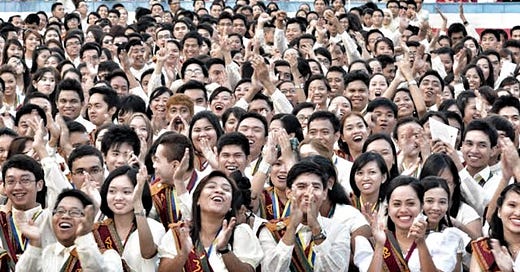Weekly Brief
Will better-educated Filipinos really make a difference to the Philippines' future fortunes as a nation?
In review and in prospect
The idea that substandard education is the reason why Filipinos are not progressing as a people is starting to wear thin. Granted, of course, there is a massive investment gap that keeps the Philippines’ public education system (within which the vast majority of Filipinos are educated) decrepit and practically ineffective at churning out smarter people. It is this “fact” of the anemic funding suffered by education in the Philippines that leads to the hasty conclusion that Filipinos remain poor because they “lack education”.
So let’s test that idea for a moment by focusing on the tiny subset of Filipinos that enjoy “world-class” education — Ateneans and alumni of the University of the Philippines (UP), presumably. So how many Ateneans and UP alumni do you see out there inventing the proverbial “longer-lasting light bulb”? How many Ateneans and Iskolars have or are in the process of building enterprises and brands that have the potential of eating the lunches of the likes of Samsung, Apple, or Toyota someday?
The trouble with the Filipino mindset is that we are ingrained with life goals predominantly framed by employment opportunities. The Philippines, as such, is a nation of employees and education is seen primarily to be a means to such a basic end. Not having a “good” education is regarded as a pretty good excuse for ending up a loser in the Philippines and that idea is what fuels the rhetoric of Filipino “activists” and apologists of Pinoy Dysfunction.
It also does not help that “activists” who take it upon themselves to “Defend UP” (specifically its role as a space for free inquiry that is “safe” from state forces) are propagating the idea that the primary value that UP, the Ateneo, and other excellent schools contribute to the collective intellect of the Philippines is “dissent” against the state. This is so wrong at so many levels because it is framed by a small subset of the intellectual capital created within the Philippines’ academic community. Most of these “activists”, after all view the world of opportunity to progress from the lens of “social justice” and the other usual fodder for their “activism” like “human rights”, “freedom”, and “equality” — stuff taken up in more of the humanities and social sciences fields.
The landscape of academic achievement, however, is bigger than these “activists” likely appreciate. Academic achievement goes beyond the social sciences and humanities fields that frame traditional “activism”. There are the so-called hard sciences — technology, engineering, and maths — that deliver the far more tangible foundations of human advancement. Whether a society is “good” or “evil” in the sense that traditional “activists” regard these terms, it is societies with strong traditions of achievement in the hard stuff that set themselves apart from all the rest. We are talking about societies that achieve great things — cure diseases, win mechanised wars, automate labor-intensive low value work, change and disrupt entire ways of life with sexy devices, build awesome public works, and, yes, invent longer-lasting lightbulbs. You need quiet achievers who are able to do the hard thinking to achieve those things and less of the shrill noisy “thought leaders” that do nothing but take students away from their books and classrooms and march them onto Manila’s steaming streets to wave placards with “social justice” clichés written on them.
Has the Ateneo and UP given sufficient profile and cultural capital to the earlier — the quiet achievers who study and do the really hard stuff that contribute tangible stuff to the country’s economic, industrial, military, and technological power? If all we get is the sound of crickets in response to that question, then the call to action becomes a lot more clear to Filipinos. Investment in education needs to be more specific — more on the hard sciences and less on the Mickey Mouse stuff that fuel the Philippines’ lame “activism”.
The last sorts of people Filipinos need are the sorts of shrieking amigas who routinely hijack their political rhetoric and make it hard for those who want to build tangible things that make real differences to ordinary Filipino lives to get a word in. It’s time we give a voice to the latter when talking about how important education is to building a society with a strong tradition of excellence and tangible achievement.
Last week's blog posts
The idiotic “EDSA people power” frame Filipino thought leaders apply to analysing world events
January 5, 2025 by Ramon Ortoll
"Any move to oust the present administration is not and will not be people power. It will be a coup d’etat. This is the main defect of our political system which is why I still believe that a parliamentary system of government is best for the Philippines..."
Do Filipino brains lack an engineering chip?
January 4, 2025 by benign0
"Systemic thinking necessarily requires broad cognitive vision — perhaps a mental skill that decades of habitual small-mindedness had irrevocably atrophied in the Philippines."
National budget fuck-up by Congress derails Duterte demonization campaign
January 3, 2025 by Ramon Ortoll
"This also affects the re-electionists congressmen and senators who were privy to the bicam’s brazen heist of public funds for their own benefit."
Why make being an oligarchy sound like such a bad thing?
January 1, 2025 by benign0
"The Yellowtards after all count amongst their lot the chi chi characters who share country club memberships with chieftains of the ruling clan. They share more common ground with the Marcoses than petty ideological differences can spice over..."


